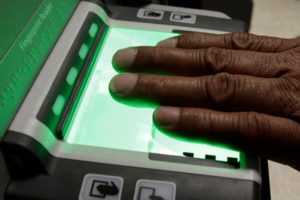Remember that constituency boundaries are set according to the number of voters; maybe it’s too late for them to adjust this time, but these figures would certainly mean less urban seats in 2023.
I am registering because I am still looking at 2018. If (and I admit this is unlikely) the procedures, as they unfold, are reasonably free and fair, I don’t want to be barred from voting. If they are not, then I won’t take part in the charade.
Yes, we have heard of soldiers beating people up in Kwekwe for not having registration slips. We can’t be sure what tricks they are playing.
Still, I only discovered a registration centre (under phase 4?) in a clasroom in the primary school almost next door. I know of no public announcement. I’ve seen nobody registering there. Maybe I should go to the “permanent” centre at the council offices.
If I register and then decide not to vote, the story does not end there and I should be prepared for the next steps. Why might I decide not to vote?
- If not all parties are allowed to campaign freely – to hold meetings without police interference and to make door-to-door visits to voters. (If you trust the cops, you might tell them about your meeting so that they can help manage the crowds or prevent anyone else from interfering with your meeting)
- If not all candidates and interested voters are allowed to check the voters’ rolls.
- If not all contesting parties are given free air time to publicise themselves, their policies and programmes, or not given equal access to advertising in the press.
- If controls are placed on the social media, beyond the existing laws against libel and hate speech. There is a lot of strange stuff circulating; I need to be as critical of any political statement as I am of strange religious material or random gossip. Don’t rush to believe anyone who doesn’t use their own name; they may have good reasons, but if so, does what they say sound credible, with enough evidence?
- If people are forced to vote or prevented from voting.
- If they are not alowed to vote secretly, e.g nobody should be forced to accept “help”; if you cannot read the ballot paper, whether you didn’t learn to read or have poor eyesight, the law says you may choose someone you trust to help you. It is your choice, nobody else’s.
- if the “biometric registration” isn’t used properly. When I went for a new passport, photos and fingerprints were taken; whenever I use the passport, officials have a computer terminal where they can call up all my details, including photo. Should every polling station have this kind of equipment, or at least a camera? If not, how can they be sure I am the person who was given the registration certificate and that I have not already voted?
- If information on voting procedures is not freely available to all voters, from sources they trust. ZEC has no right to a monopoly on “voter education”.
- If independent observers are not allowed to monitor every stage outlined above. Every contesting party is allowed an agent at every polling station; local and international observers should be allowed and voters can all compare and share their observations on how procedures are followed. That includes you and me. Outside observers who fly in on polling day, make a few flying visits to accessible polling stations and fly out as soon as the counting starts, are worse than useless.
If you and I don’t vote because we are not satisfied these conditions are met, or the vote counting is not public and transparent, we need to be prepared for how we can work together and with others to make our concerns public. There are independent organisations that can help us; the Zimbabwe Election Suport Network (ZESN) and Election Resource Centre among others.



